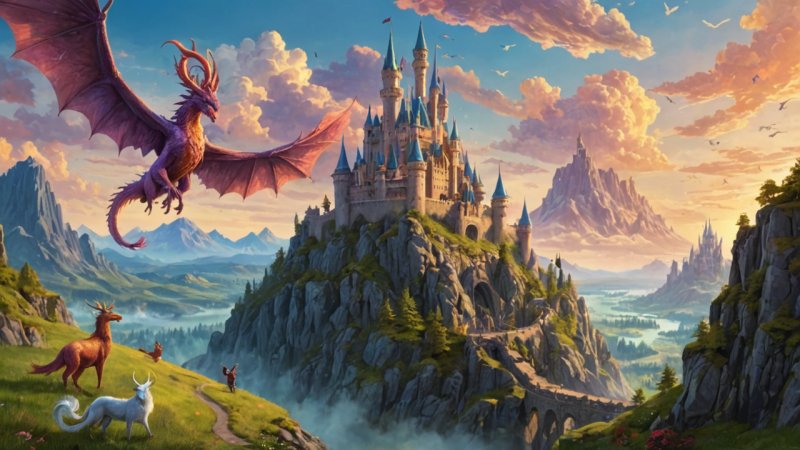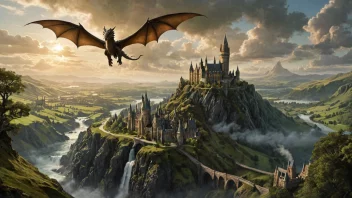The landscape of modern literature has seen a significant rise in the popularity and prominence of fantasy literature. This genre, once considered niche, has burgeoned into a cultural phenomenon, captivating readers worldwide. In this article, we will explore the rise of fantasy literature compared to traditional fiction, examining the reasons behind its surge, the influence of popular media, and its impact on readers. We will also analyze the implications of this trend for both aspiring writers and the literary community.
Understanding the Popularity of Fantasy Literature
Fantasy literature encompasses a broad range of works that involve magical elements, mythical creatures, and imaginative worlds. In contrast, traditional fiction often focuses on realistic narratives grounded in the human experience. The rise of fantasy can be attributed to several factors:
- Escapism: In an increasingly complex and chaotic world, readers seek refuge in the fantastical realms of fiction, providing an escape from their daily lives.
- Media Adaptations: The adaptation of fantasy novels into blockbuster films and television series has introduced the genre to mainstream audiences, significantly boosting its popularity.
- Community Engagement: Online platforms and social media have fostered vibrant communities of readers and fans, allowing for discussions and sharing of recommendations.
Comparing Fantasy Literature to Traditional Fiction
While both fantasy and traditional fiction share the goal of storytelling, their approaches and themes often differ significantly. Here, we will delve into the key differences:
Thematic Depth
Fantasy Literature: Often explores themes of heroism, good versus evil, and the journey of self-discovery. Works like J.R.R. Tolkien's 'The Lord of the Rings' and J.K. Rowling's 'Harry Potter' series delve into the complexities of morality and personal growth within fantastical settings.
Traditional Fiction: Typically focuses on the intricacies of human relationships and societal issues. Novels like F. Scott Fitzgerald's 'The Great Gatsby' or Harper Lee's 'To Kill a Mockingbird' tackle themes of identity, justice, and social inequality, rooted in realism.
Character Development
Fantasy Literature: Often features archetypal characters, such as the reluctant hero or the wise mentor, who embody larger-than-life qualities. These characters, while relatable, may sometimes lack the nuanced development found in traditional fiction.
Traditional Fiction: Places a strong emphasis on character depth and complexity, often presenting flawed protagonists whose journeys are more relatable to readers. This approach allows for a deeper connection with the audience, as seen in works like Virginia Woolf's 'Mrs. Dalloway' or Leo Tolstoy's 'Anna Karenina.'
World-Building
Fantasy Literature: One of the defining features of fantasy is its intricate world-building, where authors create entire universes with their own rules, cultures, and histories. Examples include George R.R. Martin's 'A Song of Ice and Fire' series, which presents a richly detailed world filled with political intrigue and diverse cultures.
Traditional Fiction: Generally operates within the confines of the real world, focusing on familiar settings and relatable environments. While authors may create vivid descriptions, the emphasis is on realism and authenticity rather than imaginative escapism.
The Influence of Popular Media on Fantasy Literature
The rise of fantasy literature has been significantly bolstered by its integration into popular media. The success of adaptations, such as 'The Witcher' on Netflix or the 'Game of Thrones' series, has propelled fantasy novels into the limelight, leading to increased readership and interest in the genre. Additionally, the gaming industry, with titles like 'The Elder Scrolls' and 'Final Fantasy,' has further popularized fantasy themes, creating immersive experiences that draw players into fantastical worlds.
The Impact on Readers and Writers
The surge in fantasy literature has notable implications for both readers and aspiring writers:
For Readers
- Diverse Options: Readers now have access to a wide array of fantasy novels, catering to various tastes and preferences.
- Community Engagement: The rise of online book communities encourages discussions about themes, characters, and recommendations, fostering a sense of belonging among readers.
- Exploration of Identity: Fantasy allows readers to explore different facets of their identities and engage with complex themes in a safe, imaginative environment.
For Writers
- Opportunities for Innovation: The growing interest in fantasy opens doors for new writers to experiment with their storytelling, pushing the boundaries of creativity.
- Market Demand: The popularity of fantasy literature creates a strong market for new releases, providing opportunities for authors to reach wider audiences.
- Challenges of Originality: With the surge in fantasy, new writers may face challenges in creating unique narratives that stand out amidst a saturated market.
Conclusion
The rise of fantasy literature in modern fiction marks a significant shift in the literary landscape. While traditional fiction continues to hold its ground, the allure of escapism, rich world-building, and community engagement has propelled fantasy into the forefront of popular culture. As readers, we can embrace the diverse themes and narratives that both genres offer. For writers, the current trends present both exciting opportunities and challenges. Ultimately, fostering a love for reading, regardless of genre, enriches our lives and broadens our understanding of storytelling.






